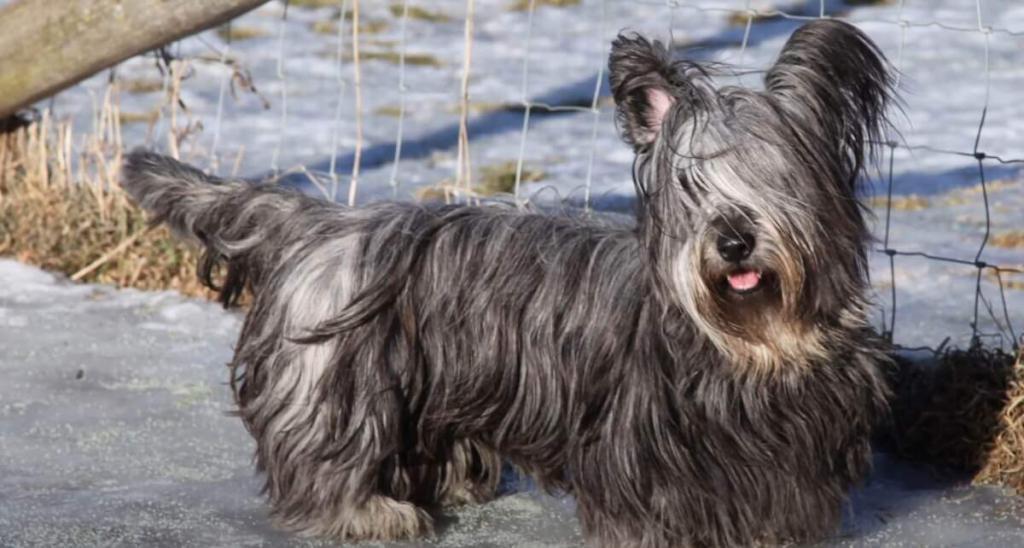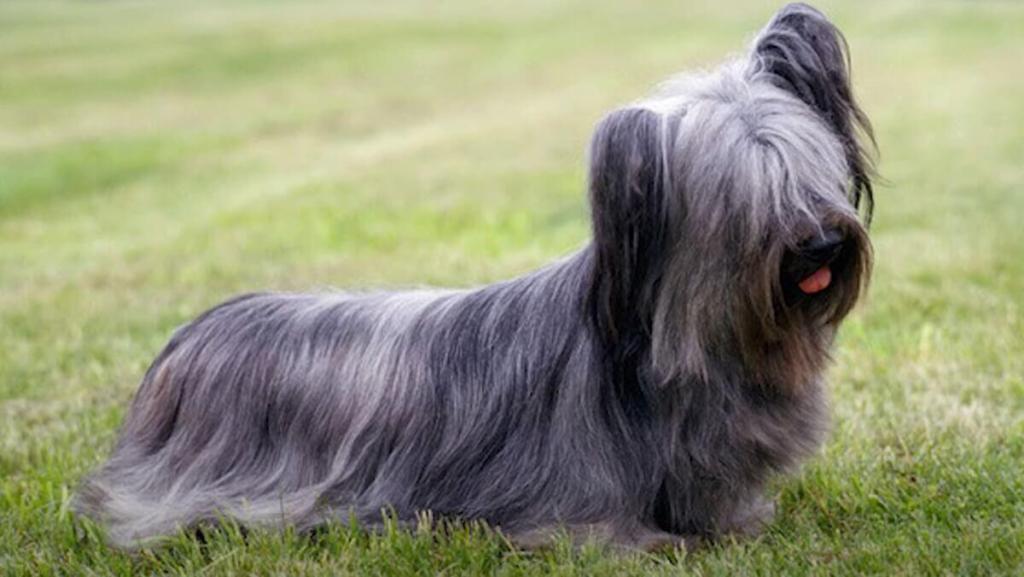As you peel back the layers of the Skye Terrier’s personality and care, you’ll uncover a tapestry as rich and intricate as the Scottish Highlands from which this breed hails. Though small, the Skye Terrier packs a loyal and dignified spirit, making it a breed that commands respect and affection.
Their striking appearance and flowing coat are a sight to behold, but their grooming and exercise requirements are as important as their looks. You might find their intelligence and independence endearing, but it’s important to remember that these qualities can lead to stubbornness without the right training.
As you contemplate adding a Skye Terrier to your life, consider the commitment you’re about to make to ensure this noble dog thrives under your care—and perhaps you’ll discover if you have what it takes to be the wind beneath their proverbial wings.
- Noise Level
- Energy
- Sociability
- Trainability
- Care
- Health
Overall
Summary
Skye Terriers are moderately energetic and sociable dogs with a moderate level of trainability. They require regular grooming and attentive care to maintain their health and well-being.
Skye Terrier: Traits, Temperament, and Care Guide
Embarking on a journey with a Skye Terrier, you’ll discover that a set of distinct physical traits and specific care requirements matches this breed’s courageous and amiable temperament.
Originating from the Isle of Skye, Scotland, these medium-sized canines are recognized for their elegant long, flowing double coat. Adaptable to apartment living, Skye Terriers are polite and exhibit low energy, ideal for indoor play and brisk walks.
They’re brave, good-natured, and loyal, yet reserved, necessitating early socialization to foster well-rounded behavior. Health-wise, vigilance is key, as they’re susceptible to conditions such as hypothyroidism and hip dysplasia.
Your Skye Terrier’s well-being hinges on regular exercise, diligent grooming, and a balanced diet—cornerstones of the care guide. Engage with breed organizations for support and ensure responsible breeding for a thriving companion.
Exploring the Characteristics of the Skye Terrier
Building on the foundational knowledge of the Skye Terrier’s care, let’s examine the breed’s physical and behavioral traits that endear them to owners worldwide. Weighing between 25 and 40 pounds, the Skye Terrier boasts a long, luxurious double coat embodying elegance and resilience. Their loyal and brave temperament and good-natured disposition create a strong bond with their family. However, caution around strangers renders them vigilant watchdogs. They thrive with early socialization and sufficient exercise to curb any unwanted behaviors.
| Characteristic | Description | Emotional Benefit |
|---|---|---|
| Loyal Companion | Good-natured and brave | Deepens sense of trust |
| Watchdog Alertness | Reserved with strangers | Provides safety and security |
| Moderate Energy | Adapts to apartment living | Ensures compatibility with various lifestyles |
To maintain their well-being, prioritize regular grooming, balanced exercise, and vigilant health care.
Skye Terrier: A Comprehensive Profile and Guide
As you consider welcoming a Skye Terrier into your life, it’s essential to understand their comprehensive profile.
This guide provides detailed insights into their needs, from the specific health concerns to the daily care required for their well-being.
You’ll learn to cater to their temperament, manage their exercise regimen, and maintain their distinct coat with appropriate grooming techniques.
Everything You Need to Know
Delving into the world of the Skye Terrier, you’ll find a breed with an illustrious history. It is characterized by its sturdy build and distinctive long coat and requires a dedicated approach to grooming and health management.
As you consider adopting a Skye Terrier, it’s essential to understand its unique characteristics and care needs.
- Origin: Isle of Skye, Scotland
- Lifespan: 12-14 years
- Temperament: Resilient, easygoing, suitable for novice owners
- Health Concerns: Hypothyroidism, hip dysplasia, allergies
- Living Needs: Adaptable to apartments, requires regular exercise

Discovering the Temperament
When considering a Skye Terrier as a pet, you’ll find their temperament to be one of good-natured loyalty, ideal for those new to dog ownership. They’re known for being loyal and affectionate companions, resilient and adaptable to being alone or facing various weather conditions. Despite their affectionate nature, they can be reserved and cautious around strangers, making them effective watchdogs.
You must engage in early socialization with your Skye Terrier to ensure they become well-adjusted adults, capable of interacting amicably with children and other pets. Employ positive training techniques consistently, as they’re intelligent dogs with a long memory. This will help mold their canny and steady nature into vigilant and discerning, enhancing their inherent watchdog abilities.
Skye Terrier: Is It a Good Fit for Families?
When considering a Skye Terrier for your family, you must evaluate their compatibility with your household dynamics, particularly if you have children. These terriers are known for their loyalty and affection towards family members, yet they exhibit a reserved disposition around strangers, necessitating thoughtful socialization.
Due to their specific health requirements, such as hypothyroidism and hip dysplasia propensity, prospective owners should prioritize obtaining a Skye Terrier from a reputable breeder and commit to regular exercise and grooming routines.
Assessing Skye Terrier’s Compatibility with Families and Kids
Regarding family life, Skye Terriers often make a great match due to their adaptable and easygoing nature, especially for those new to dog ownership. If you’re considering a Skye Terrier as a new addition to your household, it’s important to understand their compatibility with families and kids:
- Resilient temperament: Ideal for novice owners.
- Loyal and affectionate: Naturally good with children.
- Low sensitivity: Can handle alone time, fitting family rhythms.
- Early socialization: Key for harmony with kids and pets.
- Supervision required: Their small size and instincts need monitoring.
Skye Terriers can excel as family dogs when given proper attention and training. Their characteristics suggest they can integrate well into the family dynamic, offering companionship and joy to all members.
Skye Terrier Apartment Suitability
Skye Terriers are well-suited for apartment living, as their quiet demeanor and low-energy needs align with the typical requirements for harmonious multi-family housing. Their ability to adapt is commendable; these canines display polite behavior toward neighbors, fostering a sense of community and belonging. Possessing a long double coat requires regular grooming, easily managed within an apartment setting.
Indoor play and moderate exercise satisfy their physical needs, making them ideal for the contained spaces of an apartment. As a Skye Terrier owner, you’ll appreciate their calm indoor presence, essential in close-quarters living.
When you choose a Skye Terrier, you’re not just selecting a pet; you’re ensuring a peaceful and amiable environment for all residents involved.
Skye Terrier Obedience Tips
As you approach obedience training with your Skye Terrier, it’s crucial to employ consistent, patient methods to counter their natural stubbornness.
You’ll find that positive reinforcement, rewarding desired behaviors with treats or praise, is the most effective strategy for instilling obedience.
Initiating early socialization and providing ample exercise are foundational to ensuring your Skye Terrier’s responsiveness and adaptability.
Effective Training Strategies
To ensure your Skye Terrier develops into a well-behaved companion, initiate obedience training at eight weeks old, employing consistent and patient techniques that leverage positive reinforcement. Recognize that your Skye Terrier’s strong-willed nature requires you to be unyielding and composed.
Here’s a structured approach for effective training:
| Training Aspect | Technique | Outcome |
|---|---|---|
| Basic Commands | Positive Reinforcement | Reliable obedience |
| Behavioral Issues | Consistency in Correction | Improved conduct |
| Social Skills | Early Socialization | Well-adjusted temperament |
| Mental Engagement | Interactive Activities | Enhanced cognition |
| Patience | Progressive Training Sessions | Trust and comprehension |

Exercise and Grooming Needs
Keeping your Skye Terrier healthy and happy hinges on regular exercise and meticulous grooming regimen. These terriers require regular activity to channel their energy levels and avert boredom-induced mischief. Daily routines should include one or two brief walks complemented by engaging play sessions, which foster a sense of inclusion and strengthen your bond.
To preserve their distinctive long coat, implement a rigorous grooming schedule. Weekly brushing prevents matting, and periodic baths maintain coat health. Additionally, routine nail trims every few weeks and consistent dental care are imperative.
Special care is necessary for puppies to protect their developing limbs from undue stress and ensure a robust addition to your family.
Health Considerations
As you consider a Skye Terrier’s health, be aware they’re susceptible to conditions like hypothyroidism and hip dysplasia. You’ll need to monitor their health closely, ensuring they receive the proper exercise to mitigate potential genetic issues such as degenerative myelopathy.
Common Health Issues and Lifespan
Skye Terriers typically enjoy a lifespan of 12 to 14 years but are susceptible to certain health issues, including hypothyroidism, hip dysplasia, and allergies. As a member of the Skye Terrier family, you’re part of an exclusive group familiar with these dogs’ common health issues. Awareness that Skye Terriers are prone to specific conditions is crucial for maintaining their well-being throughout their lifespan.
In addition to the conditions mentioned above, they can also develop degenerative myelopathy and cleft palate. Preventive care, such as regular exercise within a loving indoor environment, is key. Proper nutrition, with about 1 3/8 to 1 7/8 cups of high-quality dog food daily, and consistent grooming support their overall health, helping to ensure that your Skye Terrier thrives for years to come.
Is Skye Terrier the Right Dog for You?
Considering a Skye Terrier as your next canine companion requires evaluating whether their distinct traits align with your lifestyle and expectations for pet ownership. These terriers adapt well to apartment living, due to their low-energy nature and tolerance for indoor activities. They don’t need a lot of exercise, but they do require brisk walks to maintain their health. Suitable for novice owners, they respond well to positive reinforcement during training.
When sourcing a Skye Terrier, engage with reputable Skye Terrier breeders who prioritize the breed’s well-being. Bear in mind their potential health issues, including allergies and hip dysplasia, necessitating regular care. This breed may be your ideal match if you seek a loyal, easygoing pet who thrives in a loving environment.
Alternatives for Skye Terrier: Distinctive and Loyal Small Breeds
For those who love the Skye Terrier’s distinctive look and loyalty, these small breeds offer a similar combination of unique appearance and devotion.
| Similar Dogs | Short Description |
|---|---|
| Dandie Dinmont Terrier | Unique in appearance with a playful and affectionate nature. |
| Sealyham Terrier | Known for its playful and friendly disposition, great as a family pet. |
| Welsh Terrier | A breed with a lively temperament and keen hunting abilities. |
| Scottish Terrier | A breed with a distinctive appearance and dignified character. |
| Bedlington Terrier | Known for its lamb-like appearance and gentle demeanor. |
Conclusion
So, you’re convinced a Skye Terrier is practically maintenance-free? Think again. This dignified Scot demands regular grooming sessions fit for royalty and exercise that can outlast the Scottish mist. Ignore these needs, and you’ll witness a fur rebellion.
In the right hands, however, the Skye reveals its true noble nature—just be prepared for a high-maintenance companionship wrapped in a facade of calm indifference. That’s the Skye spirit—surprisingly demanding, endlessly charming.
